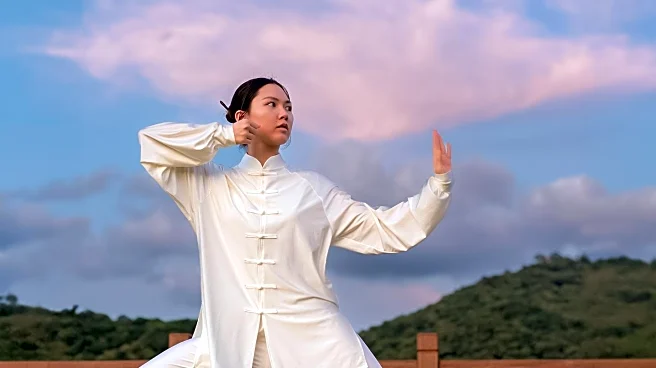What's Happening?
Recent studies have highlighted the cognitive benefits of Tai Chi, an ancient Chinese practice, after just eight weeks of regular sessions. Participants engaging in Tai Chi three times a week showed significant improvements in attention, information processing,
and cognitive flexibility compared to those performing conventional exercises like walking. MRI scans revealed increased brain volume in areas responsible for memory and decision-making, such as the prefrontal cortex and temporal lobes. These findings suggest Tai Chi's unique combination of physical movement, memorization, and steady breathing enhances executive function, which includes multitasking and decision-making abilities. The practice also boosts verbal and working memory, particularly in older adults and those with mild cognitive impairment.
Why It's Important?
The cognitive benefits of Tai Chi are significant, especially for older adults and individuals with mild cognitive impairments. By improving executive function and memory, Tai Chi offers a non-invasive, accessible method to enhance brain health and potentially reduce dementia risk. Its low-impact nature makes it suitable for a wide range of people, promoting mental engagement and focus. The practice's ability to up-regulate neurochemicals associated with learning and memory further underscores its potential as a tool for cognitive resilience against age-related decline. Tai Chi's social aspect also contributes to mood improvement, reinforcing its mind-body benefits.
What's Next?
As Tai Chi gains recognition for its cognitive benefits, it may see increased adoption in wellness programs and healthcare settings, particularly for aging populations. Long-term practitioners could experience even greater brain health improvements, suggesting potential for Tai Chi to be integrated into preventive health strategies. Further research may explore its effects on chronic illnesses and its role in enhancing quality of life. The practice's accessibility and minimal equipment requirements make it an attractive option for individuals seeking holistic health improvements.
Beyond the Headlines
Tai Chi's impact on cognitive health highlights broader implications for integrating traditional practices into modern healthcare. Its ability to enhance brain function through gentle, mindful movement challenges the conventional focus on high-intensity fitness routines. This shift towards holistic, accessible wellness practices could influence public health policies and encourage more inclusive health initiatives.
















